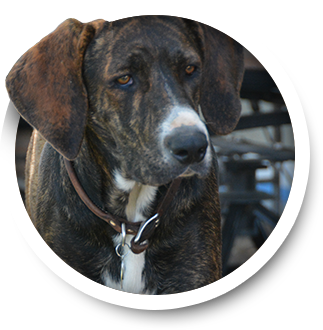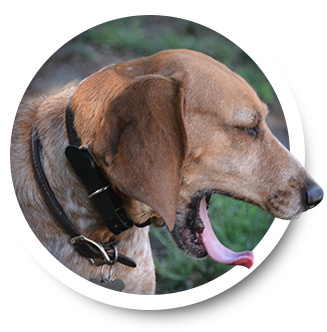Posted on 5/29/2023


STOP, LISTEN, and LEARN! I am putting on the brakes. Hey, it's Cayenne, and I am barkin' about brake service today. So take a break, and let's bark about brake service.
When it comes to preventive maintenance and vehicle care, most Los Altos drivers know how important it is to check their brakes. But brakes are more than just brake pads and shoes. There are a lot of components in the brake system, and they all need to be in good working order.
The pads and shoes are known as the friction materials in the brake system. They push together, providing friction that stops the vehicle. It's no wonder they have to be checked regularly for wear, and brake pads and shoes need to be replaced periodically.
Brake pads/shoes gradually wear out, but that doesn't mean your braking gradually becomes less effective. The pads are engineered so that they maintain good braking until they wear too thin to provide adequate friction. At this point, they need to be replaced.
But your braking system also has mechanical parts. These pistons and springs can also gradually wear out or get gummed up by oil, dirt, and other road spatter. A brake inspection at Allied Auto Works in Los Altos includes a check of these parts as well as the pads and shoes. Your friendly and knowledgeable pros at Allied Auto Works can then advise you of any parts that need cleaning or replacement.
The fluid component to the brake system needs a regular check-up at Allied Auto Works as well. The brake fluid cools and protects your brake system. Protective additives are gradually depleted by the operation of the brake system, and moisture buildup inside the fluid can diminish its effectiveness. When you have your brakes serviced at Allied Auto Works in Los Altos, the fluid should be checked and, if needed, replaced, which will clean out water, debris, and dirt.
It is important to remember that your brake system also includes your tires. No matter how well your brake system is performing, if your vehicle tires are worn, you won't get good stopping power. Traction is the power of your tires gripping the roadway. Traction is always better on tires with good tread. Good traction translates to good braking.
This is particularly important on wet Los Altos roads. A good tire will give you good braking on either wet or dry CA roads. But stopping distance increases dramatically when worn tires meet wet roads. Tread on a tire acts to channel away water as the vehicle passes over the wet road, improving contact between the tire's surface and the road, which maintains traction. But the thinner the tread, the less effective the water channels become, and water can get between the tire and the roadway, reducing friction. A loss of friction means a longer stopping distance and possibly a loss of control.
Braking depends on two things: the weight of your vehicle and the speed of the vehicle. The heavier the vehicle or, the faster the vehicle, the more braking power it requires. Thus, brake systems vary from vehicle to vehicle. For example, a pickup that is designed for heavy loads has a more powerful braking system than a compact car. Sports cars also have higher-grade braking systems than minivans.
Regardless of what kind of car you drive in Los Altos, it is always good auto advice to keep your brake system in good repair, and that means ALL of your brake system. Just one more way to keep your travels accident- and worry-free.
Here is my brake joke for this week,
My mechanic tried to convince me that my car needs new brakes
But I know that it would just slow me down.
Cayenne

Allied Auto Works
2073 Grant Road
Los Altos, CA 94024
650.968.7227
https://www.alliedautoworks.com/
Posted on 5/22/2023


Cool Hound Duke here and today we want to talk about a system in our vehicles – the cooling system. It's one of those things that Los Altos auto owners don't give much thought to until it fails and then they're stranded by the side of a road in CA. So let's stay cool and start barkin'!
Cooling systems fail more often than any other mechanical system – usually because of neglect. Don't you hate it when something breaks, and you could have done something to prevent it?
The good news is that if Los Altos drivers take care of their cooling systems, they can keep working for the life of their car.
Here at Allied Auto Works in Los Altos, we emphasize preventive maintenance services like replacing your coolant according to the factory schedule. But the various parts that make up the cooling system need attention too. The major components of the cooling system are the water pump, freeze plugs, thermostat, radiator, cooling fans, heater core, pressure cap, overflow tank, and hoses.
It sounds complicated, but we Los Altos residents don't have to be experts – we can leave that to our friendly and knowledgeable service advisor at Allied Auto Works. But, having an overview will help us remember how to take care of your car's cooling system.
Most Los Altos folks would be surprised to know that burning fuel in your engine produces up to 4,500 degrees F/2,500 degrees C of heat. And all that heat has to be dealt with. If the heat can't be drawn off the engine, the pistons will literally weld themselves to the inside of the cylinders – then you just have to throw the engine away and get a new one. That would cost thousands of dollars.
Now the water pump is what forces the coolant through passages in the vehicle engine to absorb heat. The pump is driven by a belt that needs replacement from time to time. And the water pump will eventually wear out and need to be replaced. Spending some cash on replacing the belts and water pump is much less than the cost of repairing the extremely massive damage that can be done when an engine seizes.
There's another little-known but important part of the coolant system that protects the engine. It's called a freeze plug. If you remember from high school chemistry, water expands when it freezes. In very cold areas, the coolant can actually freeze when the vehicle is left sitting.
It is hard to believe, but the expanding frozen coolant is enough to actually crack the engine block. The freeze plugs fit into the engine block. They fit tight enough to withstand the pressure of a running engine but can expand or pop out if the coolant freezes. These little things save a lot of engine blocks.
The team at Allied Auto Works can check your cooling system and make any necessary adjustments or repairs. Give them a call and tell Cool Hound Duke sent ya.
Here is my inspirational cool quote for the week,
Be who you are and say what you feel because those who mind don't matter and those who matter don't mind. Don't cry because it's over. Smile because it happened. ~ Dr. Seuss
Duke

Allied Auto Works
2073 Grant Road
Los Altos, CA 94024
650.968.7227
https://www.alliedautoworks.com/
Posted on 5/15/2023


Cayenne here and today I am a little exhausted; exhaust system, that is. Did you know that your vehicle's exhaust system is more than just a tailpipe and a muffler? In fact, it is one of the most complex systems on your vehicle. So today, we are going to bark about service for your exhaust system. Let's get the engines started!
The manifold is attached to the vehicle engine. It collects exhaust from the cylinders and directs it into the exhaust pipe. Gaskets seal the connection of the manifold to the engine and to other joints. A cracked or loose manifold or a leaking or damaged gasket can allow dangerous gases to enter the passenger compartment of a vehicle. One of these gases is carbon monoxide, which is colorless, odorless, and deadly. For this reason, it is important Los Altos residents keep their exhaust system in good repair.
The pipes that connect the various parts of the exhaust system can rust or be damaged by rocks or other road debris. Such damage can cause dangerous gases to leak into the air.
The catalytic converter is the next component of your vehicle exhaust system. It sort of looks like a muffler. Its job is to change dangerous gases into harmless carbon dioxide and water. The catalytic converter doesn't require any regular maintenance, but it can wear out. If it fails, you will need a new catalytic converter to pass an emissions test in CA. Call Allied Auto Works at 650.968.7227 if you suspect a problem with your catalytic converter.
Oxygen sensors in the exhaust pipe monitor the oxygen content of the exhaust. This helps the vehicle engine's computer keep the fuel-to-air mixture at optimal levels.
The muffler is also part of your vehicle exhaust system, but it deals with a different kind of emission. It keeps your vehicle from emitting bad sounds. Mufflers act like finely tuned musical instruments. They create a feedback of sound waves to absorb or decrease the noises made by your engine. Different mufflers can create different sound waves, so you can actually “tune” your car to produce a particular sound, anything from whisper to rumble.
It is important that damaged mufflers be replaced immediately at your Los Altos automotive service center, especially if they are leaking. Not only will the extra noise annoy your Los Altos neighbors, but a leaky muffler could also be serious.
The entire exhaust system is attached to your vehicle by hangers and clamps. These fasteners can rust, come loose, or break. The components of the exhaust system can get very hot, so when the hangers or clamps fail, these hot components can come into contact with other parts, such as wires and hoses. These can melt, causing serious damage to your vehicle. Good car care requires that you have your exhaust system inspected regularly.
Caring for your vehicle exhaust system at Allied Auto Works yields cosmetic benefits like quieting your engine sounds, but also may impact your health and safety. Your life, or the life of a loved one, may actually be on the line.
Here is my exhaust joke for you this week,
I had a dream last night that I was a muffler...
I woke up exhausted...
Cayenne

Allied Auto Works
2073 Grant Road
Los Altos, CA 94024
650.968.7227
https://www.alliedautoworks.com/
Posted on 5/8/2023

Hey it's the Duke and today we are going to steer clear of power steering problems. We usually take our vehicle's easy steering for granted until something goes wrong. Power steering is what makes it almost effortless to turn the steering wheel, aiming your vehicle in the direction you want to go. Without the assistance of power from the engine, steering would be a laborious process, so you want to make sure the system is working well. Let's set our wheels straight and get barkin'!
Power steering systems are usually one of two types, hydraulic and electric. The hydraulic type uses a pump that is driven by either a belt or an electric motor. This system uses hydraulic fluid to create pressure that gives your steering the power assist. Since that pump is always working, time and distance traveled eventually take their toll, and these systems need to be periodically inspected. Also, while that hydraulic fluid can last for years, it should be replaced periodically as it degrades over time. Your vehicle's owner's manual contains the manufacturer's recommendations.
A technician can check for leaks in the hoses, pump housing or reservoir. Also, the belts should be inspected and so should the pump, as these can fail. Signs of a failing pump are a groaning noise when you turn the steering wheel, stiff steering, squealing noises when you first start your car and puddles of a reddish-brown fluid under your vehicle.
The other type is called EPS, or electric power steering, which is becoming more commonly used in the latest vehicles. It only delivers power assist when you need it and has an electric motor that supplies that steering help. It's more efficient, accurate, compact and clean. And because it has a lot fewer components, it's easier to maintain.
If you have electric power steering, you may notice sometimes it's hard to turn the wheel or your Check Engine light comes on. Sometimes the power assist motor fails or there can be problems with electrical connections. Any time you have symptoms, it's important for your safety and that of drivers around you that you have a technician check them out.
Properly working brakes are essential for the safe operation of any vehicle. Stop! And make sure yours are working properly.
Here is my joke of the week.
What’s the most dangerous part of a car?
The nut that holds the steering wheel.
Duke

Allied Auto Works
2073 Grant Road
Los Altos, CA 94024
650.968.7227
https://www.alliedautoworks.com/
Posted on 5/1/2023

What do you fear? I fear running out of bones. Hi Cayenne here and we all fear something, even with our vehicles. Ask just about any driver about one thing they fear seeing inside their vehicle and they'll say it's the Check Engine light coming on. You know, that little light on your instrument panel that is in the shape of a vehicle engine, often accompanied by the words Check, Check Engine, Check Engine Service, or Service Engine Soon. So yes, today, we will take the fear out of the Check Engine Light. Let's get barkin'!
There are so many different reasons that light shows up, from something as simple as a loose gas cap to a more serious problem that requires immediate attention.
The Check Engine light comes on because a component of your vehicle's onboard diagnostics system is telling you something isn't operating normally. Your vehicle has a lot of sensors built in, all tied together by computers. When the sensors are showing that things somewhere aren't functioning the way they should be, they alert the vehicle's diagnostic computers and tell you something's amiss.
The simple rule is if the Check Engine light is on steadily, it's something you should have checked soon but it's not urgent. If it's flashing or has turned red or orange instead of yellow, get your vehicle checked out as soon as possible. If you don't, you may be facing some costly repairs.
Here are a few problem areas that may trigger your Check Engine Light.
- Something's wrong with the emissions equipment. Maybe too much fuel is getting into the catalytic converter, or the exhaust gas recirculation system isn't working right. Because some of these components are expensive to replace, it's worthwhile to have a technician look at your vehicle sooner rather than later.
- Your ignition system isn't working right. That means spark plugs, coils, and wires. If your engine is misfiring, that could translate into an illuminated Check Engine light.
- The transmission isn't behaving the way it should. The transmission works in tandem with the engine, so if a sensor sees something wrong there, it will tell the vehicle to turn on the Check Engine light.
As you can see, there are many things that can cause the light to come on, and when it does, it really is a good idea to find out why. When you bring your vehicle in, we have an electronic device that can read a code or multiple codes stored in your vehicle's computers. That will provide the technician with clues pointing to the cause of the trouble and helps pinpoint where that trouble is.
I leave you with this thought,
Fear makes the wolf bigger than he is. ~German proverb
Cayenne

Allied Auto Works
2073 Grant Road
Los Altos, CA 94024
650.968.7227
https://www.alliedautoworks.com/